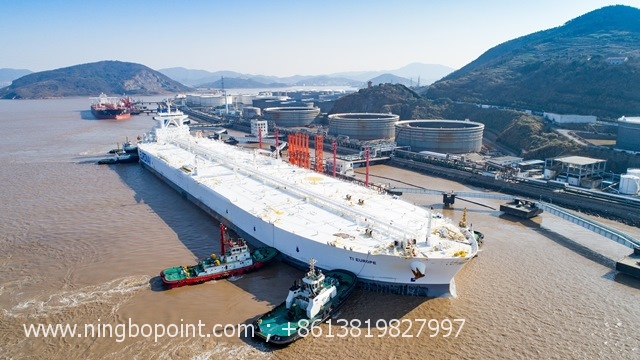Ningbo city, which is in Zhejiang Province, has shown a fantastic activity in the first half a year due to its geographical position in strategic projects “The Silk Road Economic Belt” and “Maritime Silk Road, which have a shortened name “BELT AND ROAD INITIATIVE”, and also due to increasing demand for the products made in this coastal city.
Ningbo city, which is in Zhejiang Province, has shown a fantastic activity in the first half a year due to its geographical position in strategic projects “The Silk Road Economic Belt” and “Maritime Silk Road, which have a shortened name “BELT AND ROAD INITIATIVE”, and also due to increasing demand for the products made in this coastal city.
Foreign trade has reached 362.06 billions RMB (52.6 billions US dollars) during the first 6 moths of this year, which is 26.2% higher than last year.
According to Ningbo Trading Committee, in comparison with last year, export has increased by 18.3% (238.52 billions RMB), and import has increased by 44.9% and reached 124.54 billions RMB.
With a monthly increase by 10% from January till June, the full capacity of foreign trade has taken the 9th place among Chinese cities and the first place in Zhejiang province.
Now the export capacity takes about 3.3% of whole country export and 25.7% of Zhejiang province, said the Committee.
“This is the best work of Ningbo” said the Committee assistant director Cang Yong, underlining that the growth was the fastest among the East coastal cities.
Cang also stated that the demand of the BELT AND ROAD INITIATIVE market, which includes 65 countries, contributed the high index of foreign trade in Ningbo.
The Committee admitted, that foreign trade capacity between Ningbo and BELT AND ROAD countries has reached 98.3 billions RMB, which is 28% higher than last year. This is 27.2% of the full foreign trade capacity and is equal to 63.59 billions RMB.

Ningbo has held “China – CEEC investment and trade” EXPOs three years in a row since 2015, and all the efforts has been paid off.
By the end of June, CEEC countries and Ningbo trade turnover has reached 9.47 billion RMB, which is 31.5% higher than last year. Import has increased by 89%.
According to Ningbo customs, EU, US and a number of Asian countries remain Ningbo’s biggest trade partners with turnover of 75.21, 64.58 and 30.68 billions RM, it is 19.2, 26.7 and 24.5% higher than last year.
Ningbo Huamao International Traiding Co., LTD general director Gu Wei Jun states, that their company trade turnover has reached 156 millions US dollars by June, and export capacity has increased by 3.26% comparing with last year’s 57.59 millions US dollars.
Mrs Gu says, their company has been having business relationships with Cuba for 3 years already, and export to this country has increased from 0 to 20% out of their total export in 2016. In the first have a year of 2018, this number has increased to 30%.
“We are planning that more than 50% of our total capacity will be to Cuba by the end of this year”, says the director, underlining, they will open their offices in Cuba and CEEC in October.
Among the developing countries where Ningbo exports it’s products there are Brazil, Russia, India and South Africa. In whole country, the daily used goods exports to Russia and Brazil have increased by 39.1 and 38.8%.
Moreover, according to the Committee data, the import to Ningbo from Vietnam, UAE and Chile has grown by 72.3, 66.5 and 126.2% comparing to the same period of the last year.
Private companies have made 64.2% out of total foreign trade with 225.9 billions RMB, 26.8% higher than last year, according to Ningbo customs data.
Cang Yong says: “There are about 15000 foreign trade companies in Ningbo, 108 of which are the large companies which made 40% of full foreign trade turnover”.
Export of machines and electronic devises prevail in Ningbo, it’s about 132.75 billions RMB, which is 21.7% higher than last year, and makes 55.7% of total export.
“We concentrate on high added value products export, such as machines, electronic devises and high-tech products. These products growth rate is higher than the rest, and it shows the good optimization of industrial structures of the city” states Cang Yong.
As for import, the most imported products here are ironstone, coal, refined oil and primary plastics.
In total, 15.7 million tones of ironstone, 4.97 million tones of coal, 2.36 million tones of refined oil have been imported to Ningbo in the first half a year. Plastics import capacity has reached 1.76 millions within 6 moths, which is 24.5% higher than the same period of the last year.
GNP of Ningbo has reached 446.65 billions RMB in the first six months of 2017, this is 7.8% higher than the last year.
Added value of agriculture, manufacturing and services sector has reached 13.59, 255.5 and 206.56 billions RMB, higher for 0.1, 7.4 and 8.8% than last year. Manufacturers have used 24.23 billions of kw, which is 12.5% more than last year.